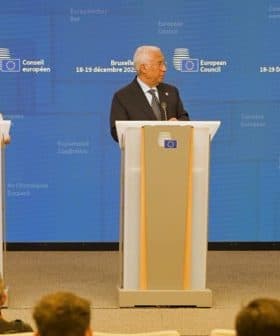As Deadline Passes to Decide Future of U.S. Tariffs, Spanish Table Olive Producers Suffer
The World Trade Organization has not yet made a decision on the 35-percent tariff imposed by the United States on black Spanish table olive imports, despite the original deadline being pushed back to the end of August due to the Covid-19 pandemic. The Spanish Association of Table Olive Exporters and Producers is urging the Spanish government and European Union to negotiate directly with the U.S. to have the tariffs removed, as the sector has suffered €150 million in export losses since the tariffs were first imposed in November 2017.
The World Trade Organization’s deadline to decide the future of a 35-percent tariff imposed by the United States on black Spanish table olive imports has come and gone, but the sector continues to feel the strain.
The international trade body originally said it would deliver its decision on the anti-dumping tariffs, which were imposed by the United States in November 2017, by the beginning of June 2021. However, this deadline was pushed back to the end of August as a result of the Covid-19 pandemic.
The sector has accumulated export losses of €150 million since the tariff nightmare began with the first rates imposed on black olives in November 2017.
Now as the second week of September begins, the WTO continues to remain silent on the issue, leading the Spanish Association of Table Olive Exporters and Producers (Asemesa) to once again demand the Spanish government and European Union negotiate directly with the U.S. to have the tariffs removed
“The sector has accumulated export losses of €150 million since the tariff nightmare began with the first rates imposed on black olives in November 2017,” Asemesa said in a press release.
See Also:Trade NewsThe table olive producers’ association also argued that the government should not count on the U.S. Commerce Department, the entity within the government that imposed the tariffs, to eliminate them on its own, as has been widely speculated in the Spanish media.
“Every year the tariffs are reviewed administratively,” Antonio de Mora, the secretary-general of Asemesa, told El País. “The provisional results of this review suggest that this reduction could take place, but it will not be immediate, since we will have to wait for the first quarter of 2022 and it will not benefit all the companies affected.”
Asemesa also warned that the Commerce Department was unlikely to eliminate the tariffs at its own discretion. The original tariffs expire in 2023, at which point the Commerce Department will decide whether or not to extend them until 2028.
“We once again urge the government of Spain and the E.U. to intensify contacts with the U.S. in order to reach an agreement similar to the one achieved in the conflict of the aeronautical industry, which was resolved with goodwill and with the suspension for five years of all tariffs on agri-food products,” said de Mora. “This is the only way to solve the problem.”
In June, the U.S. and E.U. reached a deal to suspend mutually imposed tariffs, which had been put in place as a result of the escalating disagreement over illegal subsidies provided to aircraft manufacturers, Boeing and Airbus.
At around the same time as this decision was reached, a U.S. court ruled in favor of Spanish table olive producers after it decided that the basis for the Commerce Department’s tariffs were “not in accordance with law.” However, it provided 90 days for the Commerce Department to submit new evidence to justify them.









